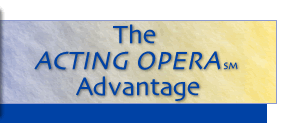|
|
||||||||
|
|
||||||||
  |
|||
WHY ACTING OPERASM? The last part of the 19th century and the early part of the 20th century saw extraordinary technological advances in the information, communication, advertising and entertainment industries. One result of these changes was the rapid rise of motion pictures. People in many parts of the world were, for the first time, able to see other people on-screen in both factual (e.g., newsreels) and fictitious settings. The enormous popularity of film caused people to become much more visually oriented, and the ensuing changes in acting-on-film caused audiences to view all productions, both on film and on stage, differently. In the last quarter of the 20th century, a change of focus became evident in opera and musical theater publications in America and Europe: they began to give specific attention to the acting component of the singer-actor's art. Underscoring and documenting this historic trend, the venerable New Grove Dictionary of Music published a four-volume Dictionary of Opera in 1992, its first ever. The editors declared: The dramatic demands of opera have to a great extent prevailed against the tastes and habits of more traditional performers and their supporters. The New Grove Dictionary of Opera The observation was frequently made that the acting of most singer-actors was stiff, self-conscious and not fundamentally believable by contemporary audience standards. Knowledgeable people at the highest levels of opera and musical theater began thinking about, talking about and calling for "believable" acting as never before. We've had singers' opera, conductors' opera, and now producers' [directors'] opera. I think the next cycle will be singing actors' opera. Singers will be required to be more flexible in their acting. They will be required to look more believable. John Dizikes, Opera in America I want you to surprise me... as long as it is convincing... Today's singers have to be more credible actors as they are more and more on television [video and film] and more and more the dramatic [element] demands it. [now we want] the singer who can deliver the whole thing--the voice, the expressive top, the dramatic intensity. James Levine, The Metropolitan Opera Further inquiry revealed that for most singers the study of acting was relegated to a remote second place behind the many years of training necessary for professional vocal development. Any acting training received by the vast majority of singer-actors was based on narrowly limited, tradition-bound and out-moded training techniques and exercises. These factors led to the creation of ACTING OPERASM The founders of ACTING OPERASM believe that training singer-actors from the point-of-view of Sanford Meisner and Charles Conrad will provide both the audience and the performers themselves the opportunity to experience genuinely fine theater--the opportunity to reveal to us our common humanity. For the German composer-librettist Richard Wagner, opera was the possibility of a multi-dimensional yet unified art work created through the integration of diverse art forms, each functioning on a high level of development. Wagner called it ein Gesamtkunstwerk ("a complete art work"). ACTING OPERASM brings Richard Wagner's dream of Gesamtkunstwerk to vivid artistic reality!
|
|||
|
|
|||